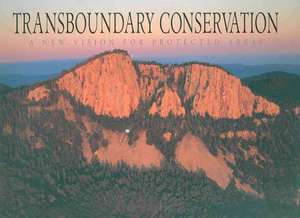Transboundary Conservation: A New Vision for Protected Areas
Autor Russell A. Mittermeier, Cyril F. Kormos, Cristina Goettsch Mittermeier, Patricio Robles Gil, Trevor Sandwith, Charles Besanconen Limba Engleză Hardback – 10 apr 2006
Conservation International has been instrumental in raising awareness and concern about the most environmentally endangered regions and animals throughout the world with its publication of high-quality volumes that combine breathtaking photography with expert scientific analysis. Continuing in this distinguished tradition, Conservation International offers here a new, lushly illustrated volume that examines transboundary conservation areas—environmentally endangered regions that sprawl across international borders and contain multiple protected areas.
Recent studies estimate that there are now 188 transboundary conservation areas in 112 countries, making up about 17 percent of the designated protected areas around the world. This book specifically examines 28 of these areas, found across all continents, from Asia to Antarctica, and in several oceans. Eminent scientists and conservationists contribute detailed histories of the areas, from the birth of the initial conservation efforts to the latest research that reveals new regions and assesses the success of the programs to protect existing ones. Accompanying the analyses are Conservation International’s trademark vibrant full-color photographs that powerfully document these rapidly disappearing treasures.
Following in the footsteps of Hotspots, Wilderness, Wildlife Spectacles, and Hotspots Revisited, Transboundary Conservation is an essential resource for all those concerned about the future of our environment.
Recent studies estimate that there are now 188 transboundary conservation areas in 112 countries, making up about 17 percent of the designated protected areas around the world. This book specifically examines 28 of these areas, found across all continents, from Asia to Antarctica, and in several oceans. Eminent scientists and conservationists contribute detailed histories of the areas, from the birth of the initial conservation efforts to the latest research that reveals new regions and assesses the success of the programs to protect existing ones. Accompanying the analyses are Conservation International’s trademark vibrant full-color photographs that powerfully document these rapidly disappearing treasures.
Following in the footsteps of Hotspots, Wilderness, Wildlife Spectacles, and Hotspots Revisited, Transboundary Conservation is an essential resource for all those concerned about the future of our environment.
Preț: 320.44 lei
Nou
Puncte Express: 481
Preț estimativ în valută:
61.32€ • 66.87$ • 51.70£
61.32€ • 66.87$ • 51.70£
Carte indisponibilă temporar
Doresc să fiu notificat când acest titlu va fi disponibil:
Se trimite...
Preluare comenzi: 021 569.72.76
Specificații
ISBN-13: 9789686397833
ISBN-10: 9686397833
Pagini: 372
Ilustrații: 264 color plates
Dimensiuni: 305 x 286 x 33 mm
Greutate: 3.08 kg
Ediția:2
Editura: Conservation International
Colecția Conservation International
ISBN-10: 9686397833
Pagini: 372
Ilustrații: 264 color plates
Dimensiuni: 305 x 286 x 33 mm
Greutate: 3.08 kg
Ediția:2
Editura: Conservation International
Colecția Conservation International
Notă biografică
Russell A. Mittermeier is president of Conservation International. Cyril E. Kormos is vice-president of policy at the WILD Foundation. Cristina Goettsch Mittermeier is a marine biologist and professional photographer. Patricio Robles Gil is founder and president of Agrupación Sierra Madre and Unidos para la Conservación. Trevor Sandwith is a biologist and conservation strategist at the South African National Biodiversity Institute. Charles Besançon is a conservation planning consultant.
Cuprins
Introduction
Three Exemplary Case Studies
1. The Waterton-Glacier International Peace Park: The First of Its Kind
2. The Great Limpopo Transfrontier Park: A Benchmark for International Conservation
3. El Carmen-Big Bend: An Emerging Model for Private Public Partnership in Transboundary Conservation
America
4. The Alaska-Yukon-British Columbia Borderlands: The World's Larges Contiguous Protected Area Complex
5. Dry Borders: Linking Nature Reserves across the Sonora-Arizona Border
6. Laguna Madre: A Major Transboundary Wetland on the Texas-Tamaulipas Border
7. The Maya Tropical Forst: Saving a Threatened Tri-National Biological and Cultural Heritage
8. La Amistad: A Long History of Transboundary Friendship in Central America
9. Vilcabamba-Amboro: Transboundary Collaboration from Andean Peaks to the Amazon Basin
10. Pantepui: The Roraima and Neblina Regions of Brazil, Venezuela, and Guyana
11. The Borderlands of Brazil and the Guianas: The World's Most Intact Tropical Rainforest
12. Iguacu-Iguazu: One of the World's Greatest Natural Wonders
Europe
13. The Pyrenees-Mount Perdu: A Shared Gem on the French-Spanish Border
14. The European Greenbelt: From Vision to Reality
Africa
15. West Africa's Upper Guinea Forest Region: Transboundary Conservation in a Conflict Zone
16. The Tri-National de la Sangha: Transboundary Conservation in the Western Congo Forest
17. The Virunga Volcanoes Transboundary Conservation Area: Home of the Mountain Gorilla
18. Serngeti-Masai: Land of the Great Migration
19. |Ai-|Ais-Richtersveld-Sperrgebiet: Transboundary Conservation in an Arid Hotspot
20. Kavango-Zambezi: The Four-Corners Transfrontier Conservation Area
21. The Roof of Africa: Transboundary Conservation in the Maloti-Drakensberg Mountains
Asia/Pacific
22. West Tien Shan: At the Crossroads of Central Asia
23. Manas: Transboundary Conservation on the Assam-Bhutan Border
24. The Lanjak Entimau/Batang Ai/Betung Kerihun Complex: A Heritage Area in the Heart of Borneo
25. Wasur-Tonda; Transboundary Conservation in the New Guinea Wilderness
Marine
26. The Mesoamerican Reef: A Shared Commitment for the Caribbean Jewel
27. The Eastern Tropical Pacific Seascape: An Innovative Model for Transboundary Marine Conservation
28. Antarctica: The Last Global Commons
Appendix
Bibliography
Recenzii
"Lavishly illustrated. . . . The heart of the book, and its chief value, lies in the 28 case studies described. . . . They are good introductions to the specific challenges faced by each area. With its beautiful photographs and lush descriptions, this book is valuable as a source of inspiration for those interested in learning more."
